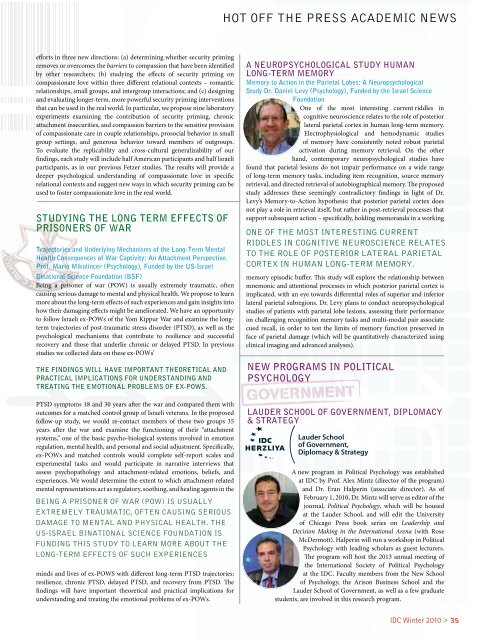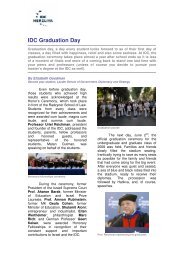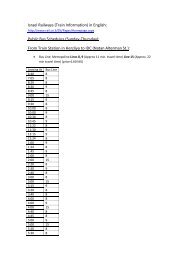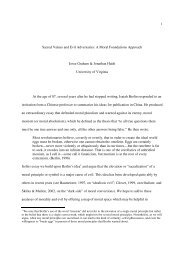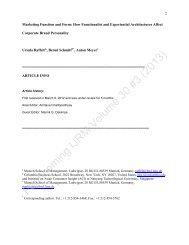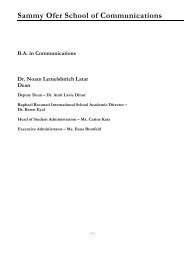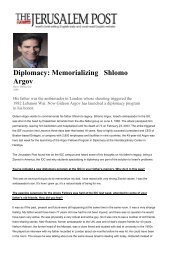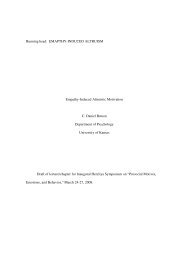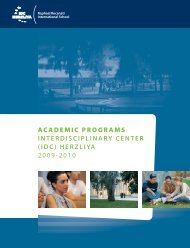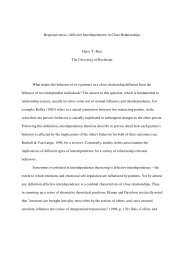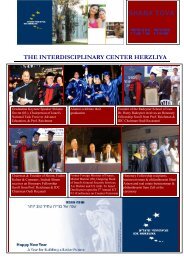The IDC
The IDC
The IDC
You also want an ePaper? Increase the reach of your titles
YUMPU automatically turns print PDFs into web optimized ePapers that Google loves.
efforts in three new directions: (a) determining whether security priming<br />
removes or overcomes the barriers to compassion that have been identified<br />
by other researchers; (b) studying the effects of security priming on<br />
compassionate love within three different relational contexts – romantic<br />
relationships, small groups, and intergroup interactions; and (c) designing<br />
and evaluating longer-term, more powerful security priming interventions<br />
that can be used in the real world. In particular, we propose nine laboratory<br />
experiments examining the contribution of security priming, chronic<br />
attachment insecurities, and compassion barriers to the sensitive provision<br />
of compassionate care in couple relationships, prosocial behavior in small<br />
group settings, and generous behavior toward members of outgroups.<br />
To evaluate the replicability and cross-cultural generalizability of our<br />
findings, each study will include half American participants and half Israeli<br />
participants, as in our previous Fetzer studies. <strong>The</strong> results will provide a<br />
deeper psychological understanding of compassionate love in specific<br />
relational contexts and suggest new ways in which security priming can be<br />
used to foster compassionate love in the real world.<br />
STUDYING THE LONG TERM EFFECTS OF<br />
PRISONERS OF WAR<br />
Trajectories and Underlying Mechanisms of the Long-Term Mental<br />
Health Consequences of War Captivity: An Attachment Perspective.<br />
Prof. Mario Mikulincer (Psychology), Funded by the US-Israel<br />
Binational Science Foundation (BSF)<br />
Being a prisoner of war (POW) is usually extremely traumatic, often<br />
causing serious damage to mental and physical health. We propose to learn<br />
more about the long-term effects of such experiences and gain insights into<br />
how their damaging effects might be ameliorated. We have an opportunity<br />
to follow Israeli ex-POWs of the Yom Kippur War and examine the longterm<br />
trajectories of post-traumatic stress disorder (PTSD), as well as the<br />
psychological mechanisms that contribute to resilience and successful<br />
recovery and those that underlie chronic or delayed PTSD. In previous<br />
studies we collected data on these ex-POWs’<br />
THE FINDINGS WILL HAVE IMPORTANT THEORETICAL AND<br />
PRACTICAL IMPLICATIONS FOR UNDERSTANDING AND<br />
TREATING THE EMOTIONAL PROBLEMS OF EX-POWS.<br />
PTSD symptoms 18 and 30 years after the war and compared them with<br />
outcomes for a matched control group of Israeli veterans. In the proposed<br />
follow-up study, we would re-contact members of these two groups 35<br />
years after the war and examine the functioning of their “attachment<br />
systems,” one of the basic psycho-biological systems involved in emotion<br />
regulation, mental health, and personal and social adjustment. Specifically,<br />
ex-POWs and matched controls would complete self-report scales and<br />
experimental tasks and would participate in narrative interviews that<br />
assess psychopathology and attachment-related emotions, beliefs, and<br />
experiences. We would determine the extent to which attachment-related<br />
mental representations act as regulatory, soothing, and healing agents in the<br />
Being A PrisOner Of wAr (POw) is usuAlly<br />
extremely trAumAtic, Often cAusing seriOus<br />
DAmAge tO mentAl AnD PhysicAl heAlth. the<br />
us-isrAel BinAtiOnAl science fOunDAtiOn is<br />
funDing this stuDy tO leArn mOre ABOut the<br />
lOng-term effects Of such exPeriences<br />
minds and lives of ex-POWS with different long-term PTSD trajectories:<br />
resilience, chronic PTSD, delayed PTSD, and recovery from PTSD. <strong>The</strong><br />
findings will have important theoretical and practical implications for<br />
understanding and treating the emotional problems of ex-POWs.<br />
hOt Off the Press AcADemic news<br />
A NEUROPSYCHOLOGICAL STUDY HUMAN<br />
LONG-TERM MEMORY<br />
Memory to Action in the Parietal Lobes: A Neuropsychological<br />
Study Dr. Daniel Levy (Psychology), Funded by the Israel Science<br />
Foundation<br />
One of the most interesting current riddles in<br />
cognitive neuroscience relates to the role of posterior<br />
lateral parietal cortex in human long-term memory.<br />
Electrophysiological and hemodynamic studies<br />
of memory have consistently noted robust parietal<br />
activation during memory retrieval. On the other<br />
hand, contemporary neuropsychological studies have<br />
found that parietal lesions do not impair performance on a wide range<br />
of long-term memory tasks, including item recognition, source memory<br />
retrieval, and directed retrieval of autobiographical memory. <strong>The</strong> proposed<br />
study addresses these seemingly contradictory findings in light of Dr.<br />
Levy’s Memory-to-Action hypothesis: that posterior parietal cortex does<br />
not play a role in retrieval itself, but rather in post-retrieval processes that<br />
support subsequent action – specifically, holding memoranda in a working<br />
One Of the mOst interesting current<br />
riDDles in cOgnitive neurOscience relAtes<br />
tO the rOle Of POsteriOr lAterAl PArietAl<br />
cOrtex in humAn lOng-term memOry.<br />
memory episodic buffer. This study will explore the relationship between<br />
mnemonic and attentional processes in which posterior parietal cortex is<br />
implicated, with an eye towards differential roles of superior and inferior<br />
lateral parietal subregions. Dr. Levy plans to conduct neuropsychological<br />
studies of patients with parietal lobe lesions, assessing their performance<br />
on challenging recognition memory tasks and multi-modal pair associate<br />
cued recall, in order to test the limits of memory function preserved in<br />
face of parietal damage (which will be quantitatively characterized using<br />
clinical imaging and advanced analyses).<br />
NEW PROGRAMS IN POLITICAL<br />
PSYCHOLOGY<br />
LAUDER SCHOOL OF GOVERNMENT, DIPLOMACY<br />
& STRATEGY<br />
A new program in Political Psychology was established<br />
at <strong>IDC</strong> by Prof. Alex Mintz (director of the program)<br />
and Dr. Eran Halperin (associate director). As of<br />
February 1, 2010, Dr. Mintz will serve as editor of the<br />
journal, Political Psychology, which will be housed<br />
at the Lauder School, and will edit the University<br />
of Chicago Press book series on Leadership and<br />
Decision Making in the International Arena (with Rose<br />
McDermott). Halperin will run a workshop in Political<br />
Psychology with leading scholars as guest lecturers.<br />
<strong>The</strong> program will host the 2013 annual meeting of<br />
the International Society of Political Psychology<br />
at the <strong>IDC</strong>. Faculty members from the New School<br />
of Psychology, the Arison Business School and the<br />
Lauder School of Government, as well as a few graduate<br />
students, are involved in this research program.<br />
<strong>IDC</strong> Winter 2010 > 35


